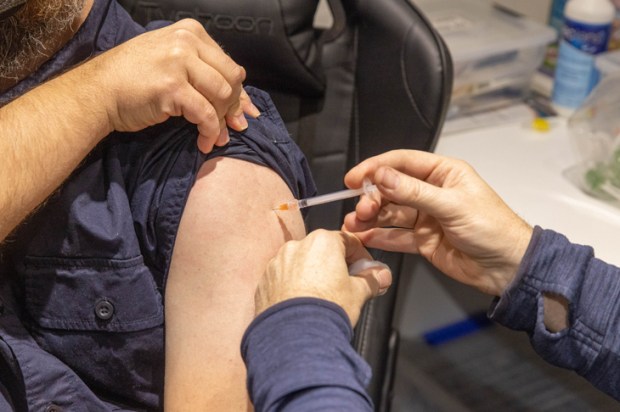On 10 September, the Therapeutic Goods Administration (TGA) banned GPs from prescribing ivermectin for preventing or treating Covid-19, citing ‘a number of significant public health risks associated with taking ivermectin in an attempt to prevent Covid-19 infection rather than getting vaccinated’. In other words it’s meant to promote vaccination. The Food and Drug Administration (FDA) warns Americans against taking ivermectin, a medicine used to deworm livestock: ‘You are not a horse. You are not a cow. Seriously, y’all. Stop it’. But the chairman of the Tokyo Medical Association Haruo Ozaki recommends it. In Africa, he says, countries that don’t distribute it have suffered seven times as many cases and thirteen times more deaths than those that do distribute ivermectin. The TGA’s proscription of ivermectin, says Rebecca Weisser, is ‘peak lunacy’. Overnight, ivermectin morphed into Voldermectin: the drug that must not be named.
There are three parallel tracks along which to assess ivermectin efficacy and risks: randomised control trials (RCTs), observational data and meta-analysis. Signals along all three indicate moderately positive outcomes, including about 30 RCTs and 40 peer-reviewed publications. Yet doubts persist about the quality of the trials and studies (publication bias, small, single-centre, open-label instead of double-blind, not fully randomised, fraudulent, etc.). An exceptionally useful, if slightly sceptical-of-centre review of all the data and studies was done by medical doctor Buzz Hollander for RealClear Science (8 September). He explains why ivermectin’s effectiveness is biologically plausible; points to several country-level studies (India, Peru, Slovakia, Zimbabwe) recording improvements in cases, hospitalisations and deaths after large-scale distribution and deployment of ivermectin; and ends up with a glass half-empty, half-full conclusion, leaving analysts open to accepting or rejecting the drug. His ‘cautious, but still curious’ overall conclusion – ‘the matter of ivermectin’s value as a Covid-19 therapeutic is still an open question under investigation’ – indicates the TGA decision to insert itself into the sacrosanct doctor-patient relationship may be premature.
From April to November 2020, Peru’s national policy was to authorise treatment with ivermectin. Peru’s 25 autonomous states deployed ivermectin at different times and for different lengths. One study by three Canada and US-based researchers, published in March, showed a 14-fold reduction in excess deaths associated with ivermectin use and a 13-fold increase after use was restricted. On Flat White I recently provided suggestive evidence via charts of the efficacy of ivermectin to tame India’s rampaging pandemic. In May this year, the state government of Uttar Pradesh (India’s most populous state with 200 million people!), boasted it had been the first to authorise large-scale prophylactic and therapeutic use of ivermectin against Covid-19 in May–June 2020 and studies were now confirming that ‘the drug helped the state to maintain a lower fatality and positivity rate as compared to other states’.
‘Meta-analysis’ refers to a study that collates and scrutinises the results from different studies already in existence in order to create a single large ‘meta’-study. This is a standard approach when the separate individual studies are statistically underpowered; the results of the meta-analysis in effect have a much higher level of statistical significance. A World Health Organisation-supported meta-analysis of 24 RCTs involving 3,328 patients by a British team, published in July, found a 56 per cent mortality reduction from ivermectin use. An analysis in May of seven RCTs, covering 1,327 patients, by Sebastian Rushworth, a practising physician in a Stockholm hospital who has his own informative and science-literate website, found ‘a 62 per cent reduction in the relative risk of dying among Covid patients treated with ivermectin’. Rushworth comments: ‘the weight of evidence supporting ivermectin… is now far stronger than the evidence that led to widespread use of Remdesivir earlier in the pandemic, and the effect is much larger and more important’. A major, and possibly the best, meta-analysis by a team led by biostatistician Andrew Bryant and medical doctor and researcher Tess Lawrie, published in the peer-reviewed American Journal of Therapeutics in June, examined 24 RCTs in 15 countries (one of which was subsequently pulled as possibly fraudulent). It concluded that ivermectin significantly helps to prevent and treat Covid-19 and, with a 62 per cent mortality reduction, can potentially save millions of lives. They published a follow-up analysis in July that removed the suspect study and the results still showed robust ivermectin efficacy.
Unfortunately, pharmaceutical companies frown on cheap generic drugs like ivermectin and few regulators of rich Western countries seem able to escape industry capture. This leaves the field of research to countries in the global south and I can understand, although I don’t share, the widespread scepticism in the West towards research results coming from them. Australian research, by contrast, would come with platinum-plated global credibility. So why, in addition to putting billions into vaccines, did the government not fund studies into Covid treatment with a sense of urgency?
I do share the cynicism towards Big Pharma. The industry has long been notorious for having the biggest lobbying budget of any sector and possibly the most successful regulatory capture of any industry. On 11 September, Liam Cosgrove provided an overview of the ‘legacy of corruption in the FDA and Big Pharma’ in Mises Wire. His list includes AstraZeneca, Pfizer, GlaxoSmithKline, Moderna, FDA officials and advisers and a director of the US Centers for Disease Control and Prevention. Remember the class action case in Australia in 2009, when court documents revealed that Merck had prepared a ‘hit list’ of doctors who criticised Vioxx, introduced to the market in 1999 and withdrawn in 2004 because of deadly cardiovascular side-effects, with the labels ‘discredit’, ‘neutralise’ or ‘neutralised’ next to their names? The judgment, delivered in March 2010, held that Vioxx doubled the risk of heart attacks and Merck had breached the Trade Practices Act by selling a drug not fit for sale. You’ll be shocked, I’m sure, to learn that in February, Merck – which makes ivermectin and has been selling it for years – released a statement questioning both its efficacy and safety. By pure coincidence, by then the drug was available off-patent for negligible commercial profit.
One of the long-standing allegations from the Left has been that Big Pharma tries to put more of normal lifestyle into the ‘sick’ category that requires treatment by drugs, the more expensive the better. The notion of asymptomatic carriers is manna to them and the copycat rush to punish entire healthy populations for being healthy – prolonged confinement indoors makes most people sicker – and inflict community-wide testing, masking and vaccination mandates must be orgiastic.
Got something to add? Join the discussion and comment below.
Get 10 issues for just $10
Subscribe to The Spectator Australia today for the next 10 magazine issues, plus full online access, for just $10.
You might disagree with half of it, but you’ll enjoy reading all of it. Try your first month for free, then just $2 a week for the remainder of your first year.














Comments
Don't miss out
Join the conversation with other Spectator Australia readers. Subscribe to leave a comment.
SUBSCRIBEAlready a subscriber? Log in